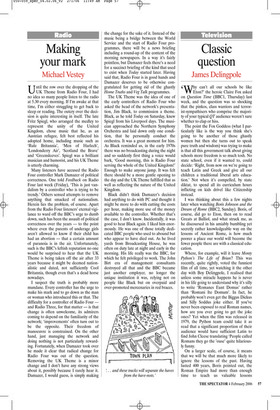Making your mark
Michael Vestey
Until the row over the dropping of the UK Theme from Radio Four, I had no idea so many people listen to the radio at 5.30 every morning. If I’m awake at that time, I’m either struggling to get back to sleep or reading. The outcry over the decision is quite interesting in itself. The late Fritz Spiegl, who arranged the medley to represent the unity of the United Kingdom, chose music that he, as an Austrian refugee, felt best reflected his adopted home, including music such as ‘Rule Britannia’, ‘Men of Harlech’, ‘Londonderry Air’, ‘Scotland the Brave’ and ‘Greensleeves’. Spiegl was a brilliant musician and humorist, and his UK Theme is utterly charming.
Many listeners have accused the Radio Four controller Mark Damazer of political correctness. One told Feedback on Radio Four last week (Friday), ‘This is just vandalism by a controller who is trying to be trendy.’ Others sensed attempts to remove anything that smacked of nationalism. Herein lies the problem, of course. Apart from the Radio Four listeners’ eternal vigilance to ward off the BBC’s urge to dumb down, such has been the assault of political correctness over the years — to the point where even the parents of underage girls aren’t allowed to know if their child has had an abortion — that a certain amount of paranoia is in the air. Unfortunately, such is the BBC’s leftish reputation no one would be surprised to hear that the UK Theme is being taken off the air after 33 years because it might be deemed nationalistic and dated, not sufficiently Cool Britannia, though even that’s a dead horse nowadays.
I suspect the truth is probably more mundane. Every controller has the urge to make his mark and to go down as the man or woman who introduced this or that. The difficulty for a controller of Radio Four and Radio Three, for that matter — is that change is often unwelcome, its admirers coming to depend on the familiarity of the network; ‘improvements’ often turn out to be the opposite. Their freedom of manoeuvre is constrained. On the other hand, just managing the network and doing nothing is not particularly rewarding. Fortunately, when Damazer took over he made it clear that radical change for Radio Four was out of the question. Removing the UK Theme is a minor change and I don’t have any strong views about it, possibly because I rarely hear it. Damazer, I would guess, is simply making the change for the sake of it. Instead of the music being a bridge between the World Service and the start of Radio Four programmes, there will be a news briefing including a round-up of the content of the morning newspapers. In a way it’s fairly pointless, but Damazer feels there’s a need for a succinct briefing of the kind that used to exist when Today started later. Having said that, Radio Four is in good hands and Damazer deserves to be otherwise congratulated for getting rid of the ghastly Home Truths and Yeg Talk programmes.
The UK Theme was the idea of one of the early controllers of Radio Four who asked the head of the network’s presentation, Jim Black, to commission a theme. Black, as he told Today on Saturday, knew Spiegl from his Liverpool days. The musician approached the Northern Symphony Orchestra and laid down only one condition, that he personally conduct the orchestra. It was a great moment for him. As Black reminded us, in the early 1970s there was no broadcasting during the night and so suddenly first thing a voice would bark, ‘Good morning, this is Radio Four serving the whole of the United Kingdom!’ Enough to make anyone jump. It was felt there should be a more gentle opening to the day and the UK Theme fulfilled that as well as reflecting the nature of the United Kingdom.
Black didn’t think Damazer’s decision had anything to do with PC and thought it might be more to do with cutting the costs per hour, making more use of the money available to the controller. Whether that’s the case, I don’t know. Incidentally, it was good to hear Black again. I liked him enormously. He was one of those totally dedicated BBC people who used to abound but who appear to have died out. As he lived yards from Broadcasting House, he was often on duty late at night and early in the morning. His life really was the BBC, for which he felt privileged to work. The John Birt era of management consultants destroyed all that and the BBC became just another employer, no longer the unique institution it was, relying not on people like Black but on overpaid and over-promoted mercenaries in red braces.





























































































































 Previous page
Previous page